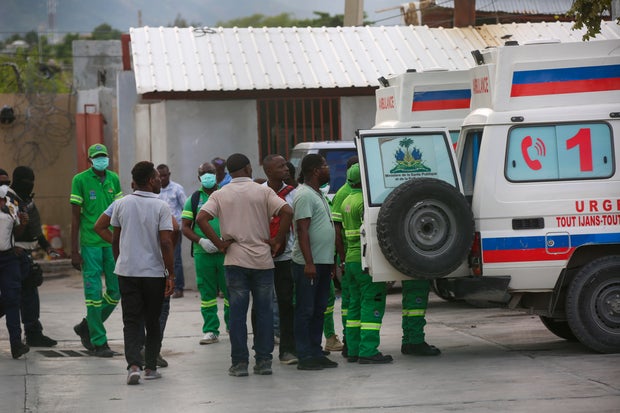Two journalists were killed and several others were injured in a suspected gang attack on Tuesday at the reopening of the largest public hospital in Port-au-Prince, the Haiti Online Media Association said.
Street gangs has taken over An estimated 85% of Haiti’s capital, Port-au-Prince, and its public hospital were forced to close early this year. Authorities had pledged to reopen the facility on Tuesday, but as journalists gathered to cover the event, suspected gang members opened fire in a ferocious attack on Christmas Eve.
Robest Dimanche, a spokesman for the online media group, said the dead journalists were Markenzi Nathaux and Jimmy Jane. Dimanche said an unspecified number of journalists were also injured in the attack, which he blamed on the Viv Ansanem gang alliance.
Odilyn Joseph/AP
Haiti Interim President Leslie Voltaire said in an address to the nation that journalists and police were among the victims of the attack. He did not specify the number of victims or the number of dead and wounded.
“I send my sympathy to the people who were victims, the national police and the journalists,” Voltaire said, pledging that “this crime will not go unpunished.”
A video posted online by journalists trapped inside the hospital showed the bodies of what appeared to be two men on stretchers, their clothes stained with blood. One of the men was carrying a lanyard with a press accreditation card around his neck.
Radio Tele Metronome initially reported that seven journalists and two police officers were injured. Police and officials did not immediately respond to calls for information about the attack.
Street gangs The general hospital was forced to close early this year during violence that also targeted the main international airport and Haiti’s two largest prisons. Federal Aviation Administration Suspended last month US airlines have grounded three planes to Haiti after gangs fired on three planes as they arrived or departed from Port-au-Prince.
Authorities pledged to reopen the facility on Tuesday, but as journalists gathered to cover the event, suspected gang members opened fire.
A video posted online earlier showed two journalists inside the building and at least three lying on the ground, appearing to be injured. This video also could not be immediately verified.
Johnson “Izo” Andre, considered Haiti’s most powerful gang leader and part of a gang known as Viv Ansanem, which controlled much of Port-au-Prince, posted a video on social media claiming responsibility for the attack.
The video stated that the gang alliance did not authorize the reopening of the hospital.
Haiti has seen journalists targeted before. In 2023, two local journalists were murdered within two weeks – radio reporter Domski Kersent was shot dead in mid-April of that year, while journalist Rekut Jan was found dead later that month.
In July, Former Prime Minister Gary Connelly visited the Haiti State University Hospital, widely known as the General Hospital, after authorities retook it from gangs.
The hospital was left destroyed and full of rubble. The walls and nearby buildings were riddled with bullet holes, indicating battles between police and gangs. The hospital is located on the other side of the street where the National Palace is located, which has witnessed several battles in recent months.
Gang attacks have pushed Haiti’s health system to the brink of collapse, with looting, arson and the destruction of medical institutions and pharmacies in the capital. The violence led to a significant increase in the number of patients and a shortage of resources to treat them.
Haiti’s healthcare system faces additional challenges during the rainy season, which is likely to increase the risk of waterborne diseases. Poor conditions in camps and temporary settlements have increased the risk of diseases such as cholera, with more than 84,000 suspected cases in the country, according to UNICEF.
https://assets3.cbsnewsstatic.com/hub/i/r/2024/12/24/af723a79-18bc-4d53-aa2a-b66e790ad339/thumbnail/1200×630/6ffcb3ac81a47c6aa75e89d0bc20011d/ap24359808988086.jpg?v=fa9977353833f46f40b07abcd9d5240b
Source link
